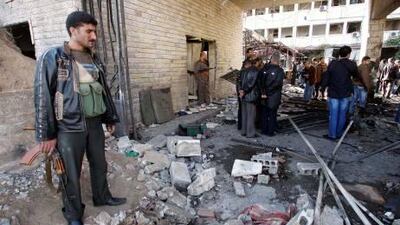DAMASCUS // Two car bombs exploded at security service offices in central Damascus yesterday morning, killing at least 37 people and wounding more than 160 others.
The attack came a day after Arab League observers arrived in the capital to begin monitoring the progress of a peace plan.
Yesterday's first bomb hit the headquarters of general state security shortly after 10am, and the second exploded at a nearby branch of an intelligence agency office.
Syrian state-run television broadcast footage from the scene at the state security office, showing body parts and corpses being removed by security staff using blankets as makeshift stretchers.
A pair of still smouldering corpses was pictured in the back seat of a destroyed car, with a crater and bloodstains on the road, and shrapnel holes in high cement blast walls.
The bomb exploded outside the main gate of the facility, which is on a busy route in the Kafa Susa neighbourhood.
A gas distribution centre, normally packed with people trying to obtain increasingly scarce fuel during the week, was, as usual, closed for the Friday holiday.
Officials said most of those killed and wounded were civilians, with security personnel also hit.
Blame was quickly placed on Al Qaeda, with Syria's foreign ministry saying it had received recent reports of Islamist militants crossing from north Lebanon.
"The Lebanese authorities warned us two days ago that an al Qaeda group infiltrated to Syria from (north Lebanon’s town of) Ersal," said Jihad Makdesi, a foreign ministry spokesman.
"And today's suicide bombers caused the death of around 40 and more than 150 injuries, all are civilians and military personnel. Freedom seekers should know that this is not the way to achieve democracy."
Arab League monitors, who arrived in Syria on Thursday to check whether the regime was honouring an agreement to halt violence against protesters, were taken to at least one of the blast sites.
"We are here to see the facts on the ground. What we are seeing today is regretful, the important thing is for things to calm down," said Sameer Seif El Yazal, one of the monitors.
The US condemned the bombings and urged the Arab League not to be put off its task.
"It is crucial that today's attack not impede the critical work of the Arab League monitoring mission to document and deter human rights abuses with the goal of protecting civilians," said state department spokesman Mark Toner.
The bombings, the first such attacks in Damascus since 2008, were widely interpreted in Syria as marking the opening of a new chapter in the uprising.
There have been two previous attacks reported on major government buildings in the capital since March - including an assault on an air force security office - but nothing close to this in scale, with neither causing any casualties.
"It was inevitable that it would come to this, we've all been waiting in fear for the moment this starts," said an independent Syrian analyst. "Things have been getting more and more out of control so it was only a matter of time before the car bombs started going off in Damascus."
He said it was impossible to know who was behind the attacks, referring to the 2008 car bomb that killed the leading Hizbollah figure Imad Mughneiya, also in Kafa Susa.
"At the time much was said about an investigation into that but we've never heard any exact details about who did it, all we are left with is speculation and guesswork," he said. "This is Syria so there will be few facts and everyone will be allowed to have their own theories."
However, he said there was "no doubt" the bombings would be useful in supporting the government's assertion that it is facing an insurgency by Islamist militants.
Supporters of the president, Bashar Al Assad, quickly blamed opposition factions for the blasts, and accused the West, Israel, Turkey and the Gulf states of trying to ignite the kind of bloodshed that occurred during years of civil war in Iraq after the US-led invasion.
With 13 bombs exploding in Baghdad on Thursday, the spectre of such carnage coming to Syria is a powerful image that has been used by the regime to bolster support among the nation's so-called silent majority, with Mr Al Assad portraying himself as all that stands between stability and chaos.
Regime supporters telephoned state-run television shows to condemn Syria's enemies. Some said the bombings proved the country was at war and, therefore, political reforms and steps towards democracy should be put on hold.
Similarly, there were calls for bolstered security deployments in urban areas, and for curfews. If implemented they would run contrary to the Arab League plan.
Opposition activists immediately accused the regime of carrying out the attacks. They said the timing of the blasts was highly suspicious and part of an effort to prove to the Arab League its claims of fighting a terrorist insurgency, rather than suppressing a largely peaceful political uprising.
Some opposition figures insisted many of those killed in the bombings were prisoners transported from areas in Idleb, where there has been heavy fighting between loyalist forces and defecting soldiers.
Despite the bombings, protests continued yesterday, with demonstrations in many of the areas that have continued to defy the authorities despite mass arrests and deployment of troops. Activists said at least 10 people were killed during the protests.
More than 5,000 civilians and defecting soldiers have bee killed by security forces since March, according to the United Nations. The Syrian authorities reject that figure and say insurgents have killed 2,000 security personnel.

